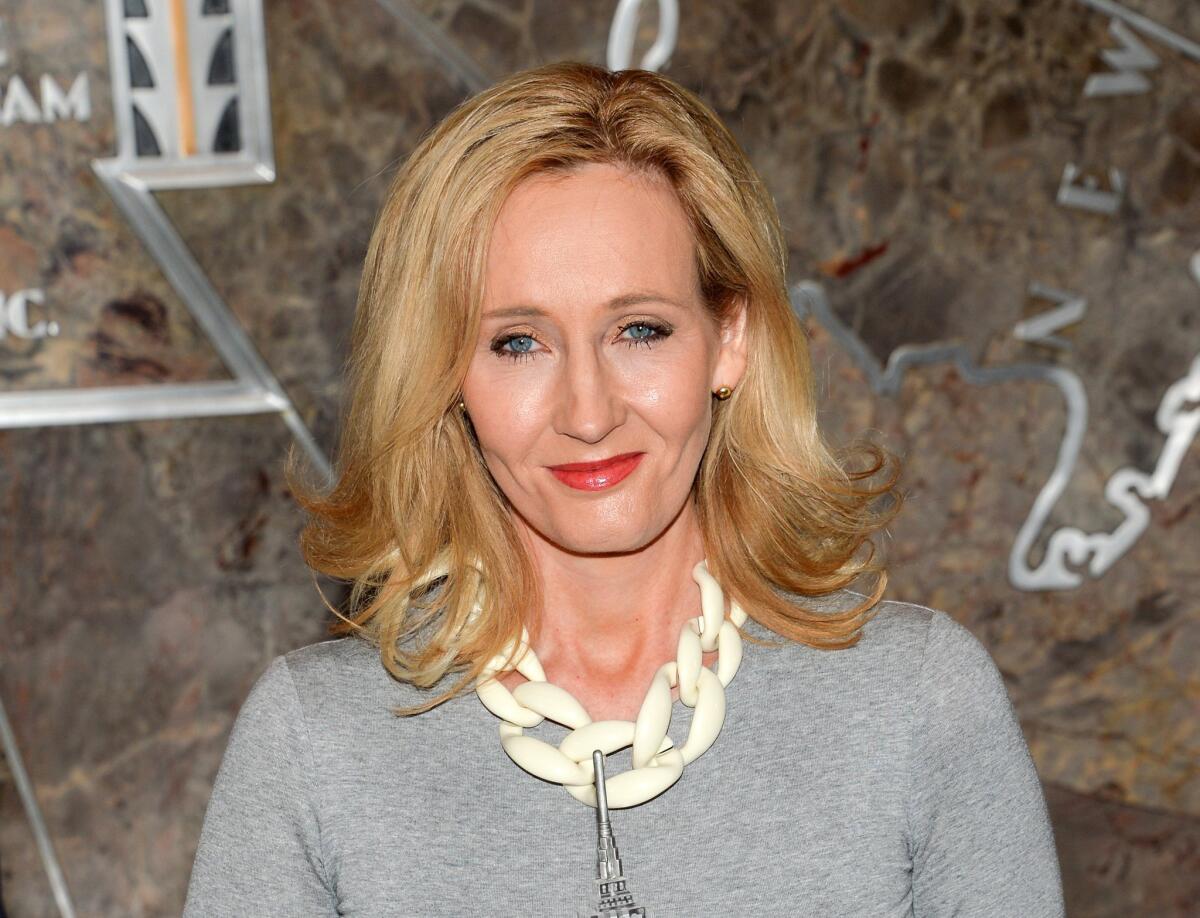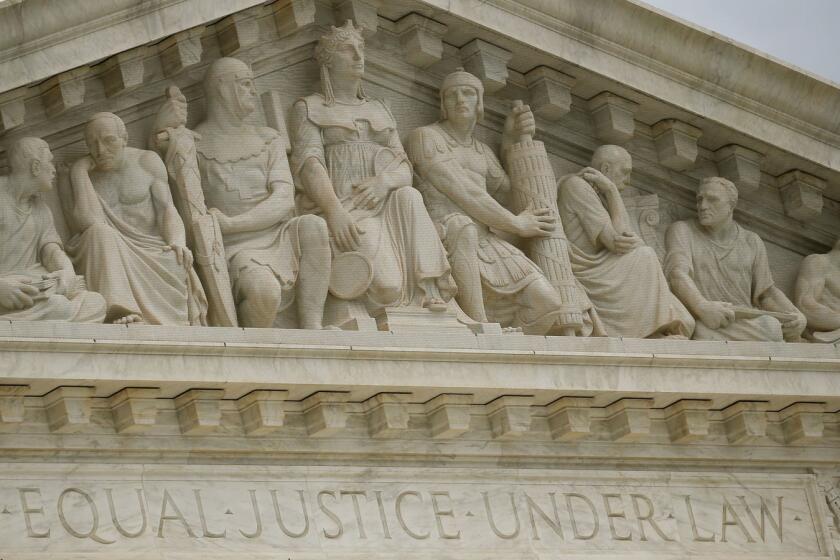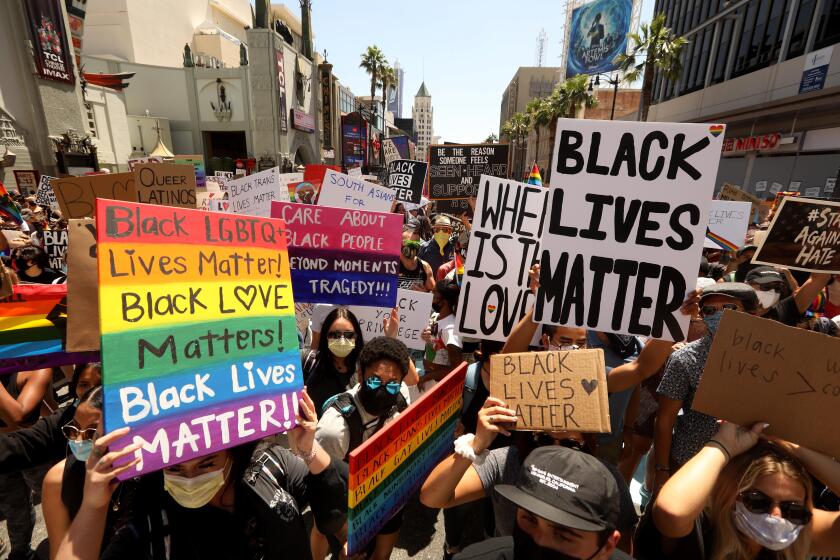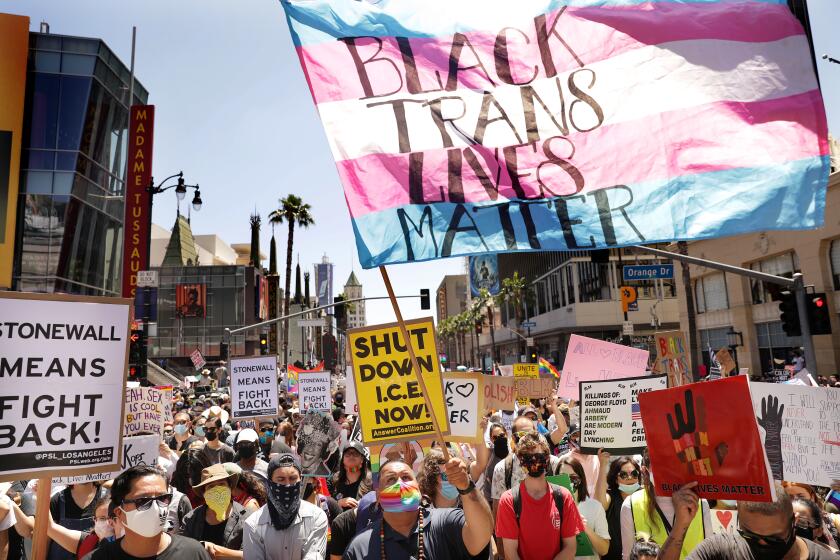J.K. Rowling and the curse of bathroom politics

- Share via
Can someone please tell me, finally and for the record, why we are so obsessed with public bathrooms?
Poke a prejudice, almost any prejudice, and pretty quickly the conversation goes straight down the toilet. Those opposed to civil rights, LGBTQ rights and the Equal Rights Amendment all have historically boiled their bigotry down to some wild-eyed fear about what equality in any form will mean to the state of our public restrooms. Black people peeing with white people, men with women, straight people with gays people, trans with cis — oh, the horror, the horror.
The latest instigator of the “Save our restrooms!” wars is, of course, J.K. Rowling, who recently reminded us that the phobia part of transphobia is very real.
Most people who are prejudiced against any gender or sexual identity that does not conform to their own personal comfort zone cloak their bigotry in religion (laying claim to a better understanding of “God’s plan” than God apparently has), statistics (why change anything for a relatively small segment of the population?) and/or general uninformed intolerance (what will these people who are not like me want next? Freedom from murder and physical abuse?).
But in her recent essay and tweets, the famous author of the “Harry Potter” series spells it right out: She is afraid that the growing acceptance of trans people — which she totally supports by the way! — pressures young people, particularly cis women, to transition when they don’t really want to (see also the lesbians-get-toaster-ovens theory of gay recruitment).
Rowling also seems to be downright terrified that women’s restrooms and changing rooms will soon be invaded by men claiming to be women for, apparently, the sole purpose of invading women’s restrooms and changing rooms.
At least she’s honest about it. Crazy — and in many of her statements, verifiably wrong — but honest.
Supreme Court rules for civil rights protection for lesbian, gay, bisexual, transgender and queer employees.
Rowling got involved in the conversation over trans rights when she offered support for Maya Forstater, a U.K. tax expert who took to Twitter to argue that trans women should not be legally regarded as women. Forstater subsequently lost her job and then her court case, in which she argued that the belief that biology determines gender is protected by law. The judge disagreed.
The Forstater case is a lot to unpack, especially on Twitter. But Rowling — an author who devoted hundreds of pages of her final “Harry Potter” book to Harry and Hermione wandering about trying to figure out Horcruxes — decided that in this instance, an abbreviated “biology equals destiny”-type argument would do the trick.
Her recent decision to double down on these statements raises many questions, most of which begin with “why?”
Why? Why, if you support the rights and the safety of trans people, would you make public statements that undercut those rights and that safety? Why, in the middle of a pandemic and international protests over racism, would you continue the conversation by writing an essay that “clarifies” your ill-argued yet weirdly precise, self-admittedly fear-based position, forcing everyone else associated with the “Harry Potter” franchise to denounce your words?
Ironically, and mercifully, the many strong statements against Rowling’s stance have benefited the trans community — particularly, given recent weeks of protests over racism, the Black trans community — even as the U.S. Supreme Court affirmed their protection under civil rights law.
The Supreme Court ensured workplace protections for gay and transgender Americans, but all told, Monday was a draw for equal rights.
But my questions are not directed only at Rowling. What about us? Why exactly have we granted this woman the cultural status that makes her believe her thoughts about the difference between sex and gender are of interest to anyone? Rowling wrote a series of books that helped resurrect publishing and make YA literature a genre with standing; those books were turned into a series of terrific movies and several very fine theme park attractions. So clearly, she is a good YA writer and a tremendously canny and successful businesswoman.
Not, you know, a political activist, a public servant or an expert on anything except her own fiction.
Her past support for “liberal” causes — welfare, childcare and women’s and gay rights — convinced many fans that Rowling was a progressive powerhouse. But it was her fans who made her opinion meaningful, so instead of “canceling” the joy the books and films and parks have given so many, let’s cancel the need to hero-worship people beyond their demonstrated skill set.
And while we’re at it, let’s take a long look at why we have allowed public restrooms to be used as some weird yet often highly effective exhibit in the case against human equality.
Seriously, it is beyond Freudian. As humans, we are capable of urinating, defecating and changing our tampons just about anywhere. (Let’s each pause for a moment to remember all the places we have done one or all of these things.) Public restrooms exist for our general sanitation, convenience and privacy. I’m not at all sure what “safety,” other than safety from cholera, has to do with it.
But the children!, people cry. What harm will be done to the children? During the bathroom wars of 2016, some, including Sen. Ted Cruz, like Rowling, argued that allowing trans people to use gender-appropriate restrooms would result in “little girls alone in bathrooms w/grown men,” which not only denies the existence of trans women, it implies that grown men are, by their very nature, dangerous.
Unfortunately, crimes are committed in public restrooms with the same regularity that they are committed in movie theaters, schools and churches, those “men” and “women” signs notwithstanding.
As someone who has used both women‘s and men’s bathrooms (really, you haven’t? Not even when the line for the women’s room is super long?), the only reason I can see for gender segregation is that men’s tolerance for ambient filth appears to be generally higher than women’s, which I suppose saves on labor and paper-product cost.
The ‘All Black Lives Matter’ march was organized by the Black Advisory Board, made up of Black LGBTQ+ leaders and organizations.
Urinals can be completely horrifying to those of us who do not use them, but if that’s the issue, what’s wrong with more stalls? Stalls offer privacy for any activity one might need to perform in a public restroom, which means the only forced human interaction occurs at the sink. You’re afraid to share a sink with a person of a different gender? Please.
Rowling, and many others, appear to believe that gender-specific bathrooms are magical rooms of protection; Rowling says her fears derive from her personal experience of domestic violence and sexual assault, both of which are terrible things and I am very sorry they happened to her. But will any person intent on committing a crime be deterred by the fact that they must enter the “wrong” bathroom to do it?
And is she honestly afraid that men will falsely identify as trans women for the purpose of terrorizing women at the maxi-pad dispenser?
I don’t know what all the “save our bathrooms” folks think is going on in public restrooms, beyond the obvious, but I do know that it’s never perceived as a problem until someone asserts their entitlement to equal rights. (Actually, I thought we loved a little stall sex now and again; certainly our movies and TV series are full of it.)
And what are we to do with the fact that in the “Harry Potter” series, Harry, Ron, Hermione and Moaning Myrtle spent so much time scheming together in a girls’ bathroom?
If it were up to me, bathrooms would be categorized “Urinals” and “No Urinals” and all of them would be bigger, with more stalls, free condoms and sanitary supplies, and dedicated staff paid a decent wage. Perhaps the safety requirements of COVID-19 will require these and other changes that will give us all a bit more space.
But people talking about the sanctity of gender-segregated bathrooms should stop using the word “safety” when they mean “my own problematic emotional comfort.”
Safety is, of course, never the point; power and control are always the point. Public restrooms put us in close contact with many different sorts of people, some of whom may make us feel uncomfortable. I myself am not a huge fan of women who flush their tampons despite all of the signs instructing them not to do so, or those who monopolize large amounts of sink space while they give themselves a 17-step makeover. When the line is really long, I too sometimes wonder what, exactly, is up with the person in the third stall who has been in there for like an hour.
But you know what? It’s none of my business. It’s a public bathroom, and the public, which means everyone, is known to be irritating, endearing and unexpected in many ways everywhere all the time.
So say what you mean, J.K. Rowling. “Some of my best friends are trans people — I just don’t want them using my bathroom.”
Sound familiar? It sure does. Smells familiar too. Just don’t forget to flush on your way out.
More to Read
The biggest entertainment stories
Get our big stories about Hollywood, film, television, music, arts, culture and more right in your inbox as soon as they publish.
You may occasionally receive promotional content from the Los Angeles Times.













